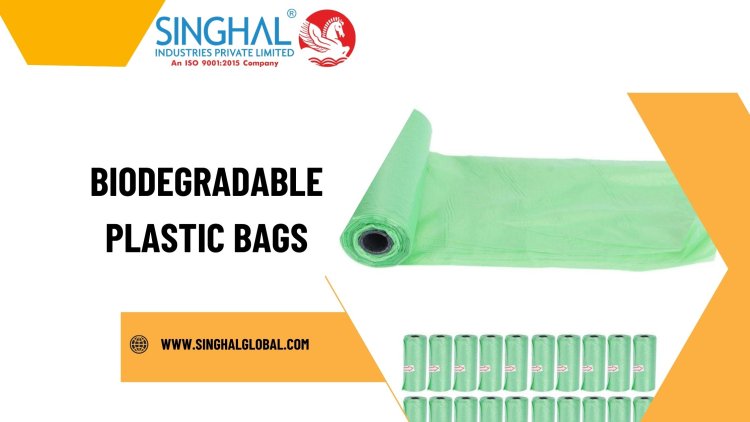Biodegradable Plastic Bags: A Step Towards a Greener Future
In our ever-evolving world, sustainability has become more than just a buzzword; it's a necessity. Among the various innovations aiming to reduce our environmental footprint, biodegradable plastic bags have emerged as a promising solution.
Share this Post to earn Money ( Upto ₹100 per 1000 Views )

Introduction
In our ever-evolving world, sustainability has become more than just a buzzword; it's a necessity. Among the various innovations aiming to reduce our environmental footprint, biodegradable plastic bags have emerged as a promising solution. These bags are designed to break down more quickly than conventional plastic, offering a step towards a greener future.
The Environmental Impact of Traditional Plastic Bags
Traditional plastic bags, while convenient, have a significant environmental cost. They contribute heavily to pollution and landfill issues. These bags can take hundreds of years to decompose, releasing harmful chemicals into the soil and water. Moreover, they pose a severe threat to marine life, with countless animals ingesting or becoming entangled in plastic waste.
What Makes Biodegradable Plastic Bags Different?
Biodegradable plastic bags are designed to decompose more quickly than their conventional counterparts. They are made from materials such as cornstarch, potato starch, or other organic substances that break down into natural components. The process of decomposition is facilitated by microorganisms, which consume the organic materials, reducing the environmental impact.
Types of Biodegradable Plastic Bags
Compostable Plastic Bags: Compostable bags are designed to break down in composting environments, turning into nutrient-rich compost rather than just degrading into microplastics. These are particularly useful in commercial and industrial composting facilities.Biodegradable Plastic Produce Bags These are specifically designed for use in grocery stores and markets. They help reduce plastic waste associated with fruits and vegetables. Made from materials like cornstarch or cassava, they decompose under the right conditions, minimizing their environmental impact.
Benefits of Biodegradable Plastic Bags
-
Environmental Benefits: The primary advantage is their reduced environmental footprint. Biodegradable bags break down more quickly and are less likely to contribute to landfill overflow or marine pollution.
-
Economic Benefits: As technology advances, the cost of biodegradable plastic bags is decreasing. Businesses can benefit from using these bags as they often align with corporate social responsibility goals and can attract environmentally conscious consumers.
-
Health Benefits: By reducing plastic pollution, biodegradable bags help to create a healthier environment, which in turn benefits public health. Less plastic waste means fewer toxins and pollutants entering the food chain and water supply.
Challenges in Adopting Biodegradable Plastic Bags
-
Cost Considerations: Despite decreasing prices, biodegradable bags can still be more expensive than traditional plastic. This can be a barrier for widespread adoption, especially for small businesses.
-
Performance and Durability: Some biodegradable bags may not perform as well as conventional plastic bags, particularly in extreme conditions. Ensuring they meet the required standards for strength and durability is essential.
Biodegradable Plastic Bags Suppliers and Manufacturers
-
Biodegradable Plastic Bags Suppliers in Chennai is home to several suppliers offering a range of biodegradable plastic bags. These suppliers play a crucial role in making sustainable options accessible to consumers and businesses alike Kolkata features manufacturers who specialize in producing biodegradable bags. Their innovative solutions contribute to reducing plastic waste in the region and beyond.
Singhal Industries: A Leader in Biodegradable Solutions
Singhal Industries is a prominent player in Biodegradable Plastic Bags Manufacturers in Kolkata The company offers a diverse range of biodegradable products, including bags suited for various applications. Their commitment to quality and sustainability positions them as a leading choice for those seeking eco-friendly packaging solutions.
How to Choose the Right Biodegradable Plastic Bags
-
Assessing Your Needs: Consider the specific use case for the bags. Different types of biodegradable bags are suitable for various applications, from produce bags to compostable waste bags.
-
Evaluating Product Quality: Ensure the bags meet industry standards for biodegradability and performance. Look for certifications and test results that verify the product's claims.
Regulations and Standards for Biodegradable Plastic Bags
-
International Standards: Several international standards govern the production and disposal of biodegradable plastic bags. Familiarizing yourself with these standards ensures compliance and supports the global effort towards sustainability.
-
Local Regulations: Different regions may have specific regulations regarding biodegradable bags. Understanding and adhering to local laws is crucial for both suppliers and consumers.
The Future of Biodegradable Plastic Bags
-
Innovations and Trends: The biodegradable bag industry is continuously evolving. Innovations in materials and production processes are making these bags more efficient and cost-effective.
-
Consumer Awareness: As awareness of environmental issues grows, consumers are increasingly demanding sustainable products. This shift in consumer behavior drives the development and adoption of biodegradable plastic bags.
Conclusion
Biodegradable plastic bags represent a crucial step towards reducing our environmental impact and promoting sustainability. By understanding their benefits, challenges, and the role of key players like Singhal Industries, we can make informed choices that contribute to a greener future. Embracing these eco-friendly alternatives is not just a trend but a necessary action for preserving our planet for future generations.
FAQs
-
What are biodegradable plastic bags made of?
Biodegradable plastic bags are made from materials like cornstarch, potato starch, or other organic substances that break down more easily than conventional plastics. -
How long does it take for biodegradable plastic bags to decompose?
The decomposition time varies depending on the material and conditions. Generally, biodegradable bags break down within a few months to a year. -
Are biodegradable plastic bags more expensive than regular plastic bags?
Yes, biodegradable bags can be more expensive, but prices are decreasing as technology advances and production scales up. -
Can biodegradable plastic bags be recycled?
Biodegradable plastic bags are not typically recyclable with standard plastic recycling. They should be disposed of according to local composting or waste management guidelines. -
Where can I find biodegradable plastic bags suppliers in Chennai?
Suppliers in Chennai offer a range of biodegradable plastic bags. You can find them through local business directories or industry-specific platforms.
















